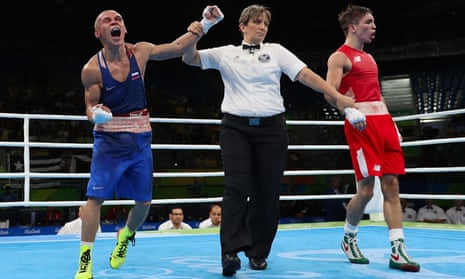Amateur boxing’s governing body, Aiba, has been stripped of its right to host the Tokyo 2020 Olympic boxing tournament after a devastating report said its behaviour presented serious legal, financial and reputational risks to the IOC and the Olympic Movement”.
Boxing will, however, remain in the 2020 Games, with the International Olympic Committee confirming a taskforce headed by Morinari Watanabe, president of the International Gymnastics Federation, would be charged with overseeing the tournament.
The IOC president, Thomas Bach, also raised the issue of a professional boxing body getting involved in the Olympics after setting Watanabe a deadline of the end of June to come up with a plan.
“I am sure the taskforce will be in contact with some professional boxing organisations and maybe other partners,” said Bach, who also confirmed that Aiba would not return to the Olympic movement without “fundamental change”.
The IOC said it had to act after a six‑month investigation found multiple problems with Aiba, including the risk it could go bankrupt given its parlous financial state, which meant it could not even open a Swiss bank account despite being based in Lausanne.
The IOC report also flagged up “ongoing legal, reputational and financial risks” due to Aiba’s president, Gafur Rakhimov, being identified as “a key member of the Brothers’ Circle, a ‘criminal group composed of leaders and senior members of several Eurasian criminal groups’” by the US Treasury Department, which also said he was “one of the leaders of Uzbek organised crime”. Rakhimov denies any wrongdoing.
The IOC confirmed that it continued to have concerns about judging in the sport as well as the conflicts of interest among several Aiba board members. In its conclusion it also warned: “It is unclear how Aiba will be able to fulfil its roles and responsibilities according to the Olympic Charter, which are primarily the development of sport and support to the athletes.”
Aiba is yet to respond publicly to the IOC’s decision. But this month it told the Guardian it would consider legal action if it was suspended.
It also maintains that many of the problems identified by the IOC came about during Wu Ching-kuo’s controversial 11-year reign at the top of amateur boxing’s governing body between 2006 and 2017. It says it has made substantial reforms since.
But the IOC was unconvinced, pointing out that in its report that many longstanding issues with Aiba remained – and that a number of people who were in senior positions under Wu remain in the organisation.
